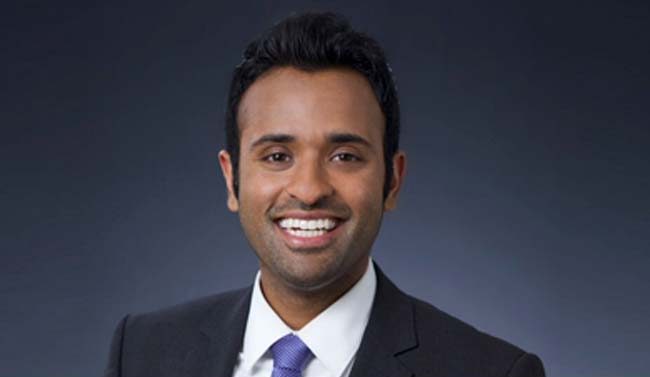Vivek Ramaswamy enters Republican race for White House

Vivek Ramaswamy
 Biotech entrepreneur, investor and author is the second Indian American after Nikki Haley to challenge Donald Trump
Biotech entrepreneur, investor and author is the second Indian American after Nikki Haley to challenge Donald Trump
Vivek Ramaswamy, a wealthy biotech entrepreneur, investor and author has entered the race for Republican presidential nomination becoming the second Indian American after Nikki Haley to challenge former President Donald Trump.
In a video released Tuesday night, Ramaswamy, 37, formally launched his longshot bid by decrying what he called a “national identity crisis” that he claims is driven by a left-wing ideology that has replaced “faith, patriotism and hard work” with “new secular religions like Covid-ism, climate-ism and gender ideology.”
Read: Vivek Ramaswamy exploring 2024 presidential run (February 14, 2023)
“We’ve celebrated our ‘diversity’ so much that we forgot all the ways we’re really the same as Americans, bound by ideals that united a divided, headstrong group of people 250 years ago,” he said. “I believe deep in my bones those ideals still exist. I’m running for President to revive them.”
“We’re in the midst of a national identity crisis. Faith, patriotism & family are disappearing. We embrace one secular religion after another — from wokeism to climatism — to satisfy our deeper need for meaning. Yet we cannot even answer what it means to be an American,” Ramaswamy said.
“The GOP can fill that void. E pluribus unum: from many, one. That is the dream that won the American Revolution; that reunited us after the Civil War, that won us two World Wars & the Cold War. That is the dream that still gives hope to the world. That is American exceptionalism.”
Born in Ohio, Ramaswamy, the son of Indian immigrants from Vadakkencherry in Palakkad, Kerala, co-founded Strive Asset Management and currently serves as the Executive Chairman. Prior to Strive, he founded the biopharmaceutical company Roivant Sciences.
He is also the author of the books, “Woke, Inc.: Inside Corporate America’s Social Justice Scam”, published in August 2021 and “Nation of Victims: Identity Politics, the Death of Merit, and the Path Back to Excellence”, published in September 2022.
Read: Nikki Haley joins 2024 US presidential race (February 14, 2023)
Ramaswamy filed a statement of candidacy with the Federal Election Commission earlier on Tuesday and is scheduled to speak at a Polk County Republican event in Iowa on Thursday.
Meanwhile, Haley, the first Indian American to serve in a presidential cabinet as US ambassador to the UN under former president Donald Trump, has seen a boost in popularity after launching her 2024 presidential campaign last week, according to a new Morning Consult poll released on Wednesday.
Six percent of Republican primary voters in the poll said they would support Haley in their state’s primary or caucus — double the share she received in the same poll the week before.
However, Haley remains well behind Trump and Florida Governor Ron DeSantis, who received 50 percent and 30 percent of Republican primary voters’ support, respectively, in the poll. Haley is also tied with former Vice President Mike Pence at 6 percent.
While her boost in a likely primary match-up was modest, Haley did see a significant increase in popularity, with 62 percent of Republican primary voters saying they have a favorable view of the Republican candidate. This is up 17 percent from before her campaign announcement on Feb 14.
In a potential general election against President Joe Biden, DeSantis is currently the only Republican candidate polling ahead of the president. While DeSantis holds a 1-point lead over Biden in the poll, Trump stands 1 point behind his former 2020 opponent and Haley remains 6 points behind.
Read: Biotech Founder Vivek Ramaswamy Enters 2024 GOP Presidential Race (February 21, 2023)
DeSantis has yet to announce his candidacy, but the Florida governor is widely seen as one of Trump’s top competitors for the Republican nomination.
The Morning Consult poll on the Republican primary was conducted from Feb 17-19 with 3,217 potential primary voters and had a margin of error of plus or minus 1 to 2 percentage points.

